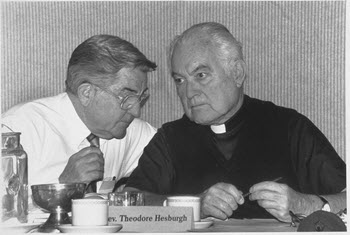About The Knight Commission
Purpose
The purpose of the Knight Commission on Intercollegiate Athletics is to develop, promote and lead transformational change that prioritizes the education, health, safety and success of college athletes.
Overview
The Knight Commission on Intercollegiate Athletics is an independent group with a legacy of leading reforms that strengthen the educational mission of college sports.
The John S. and James L. Knight Foundation formed the Commission in October 1989 to recommend a reform agenda in response to highly visible athletics scandals and low graduation rates for college football and men’s basketball players that threatened the integrity of higher education.
 William C. Friday and Rev. Theodore Hesburgh, two icons in higher education, were the founding co-chairmen and provided leadership for the Commission’s 1991 seminal report, Keeping Faith with the Student-Athlete: A New Model for Intercollegiate Athletics. This report provided a roadmap for reform and was quickly embraced by higher education leaders. It proposed a new “one-plus-three” model for governing intercollegiate athletics: presidential control directed toward academic integrity, financial integrity and independent certification. By the late 1990s, the NCAA had enacted a majority of the Commission’s recommendations to strengthen academic standards and improve athletics governance.
William C. Friday and Rev. Theodore Hesburgh, two icons in higher education, were the founding co-chairmen and provided leadership for the Commission’s 1991 seminal report, Keeping Faith with the Student-Athlete: A New Model for Intercollegiate Athletics. This report provided a roadmap for reform and was quickly embraced by higher education leaders. It proposed a new “one-plus-three” model for governing intercollegiate athletics: presidential control directed toward academic integrity, financial integrity and independent certification. By the late 1990s, the NCAA had enacted a majority of the Commission’s recommendations to strengthen academic standards and improve athletics governance.
Subsequent reports and recommendations continue to influence and contribute to positive change. Among the Commission’s recommendations that led to major policy changes: requiring teams to be on track to graduate at least 50 percent of their players to be eligible for NCAA postseason championships and bowl games and including academic incentives in the NCAA’s revenue distribution plan.
The Knight Commission also has long had an impact on the governance of college sports—from its successful push in the 1990s to influencing the addition of independent directors to the NCAA’s highest governing board.
The Commission’s recent efforts and research have helped shape public and internal discussion about the principles and policies guiding college sports, including rules to allow college athletes to earn compensation from the use of their name, image and likeness and approaches to transform the D-I Model.
The Commission’s meetings provide a public platform for thoughtful discussion of the most pressing issues facing college sports.
In an effort to strengthen financial transparency and inform policy development, the Knight Commission produces resources about the finances of Division I college sports programs, the NCAA, and the College Football Playoff. The Commission partners with Syracuse University’s S.I. Newhouse School of Public Communications to produce the Knight-Newhouse College Athletics Database.
All reports, news releases, studies and white papers can be accessed on knightcommission.org. You can follow us on Twitter @KnightAthletics.
